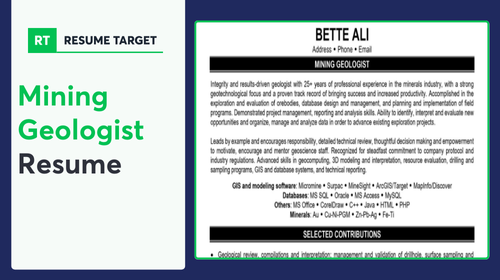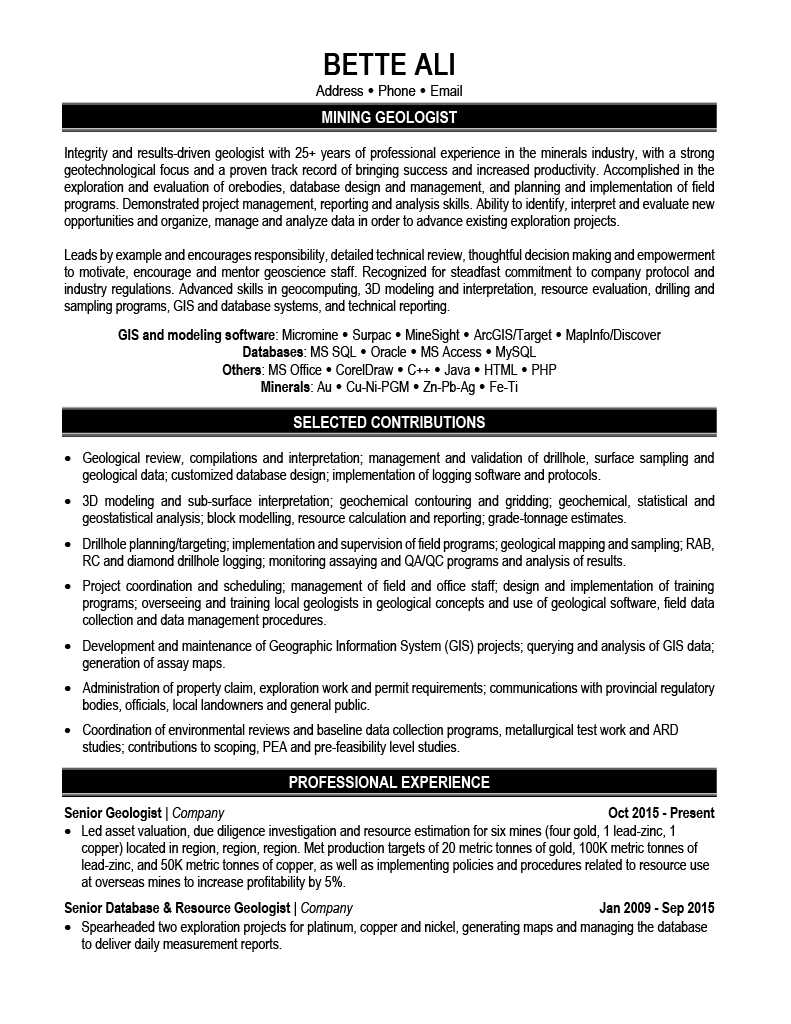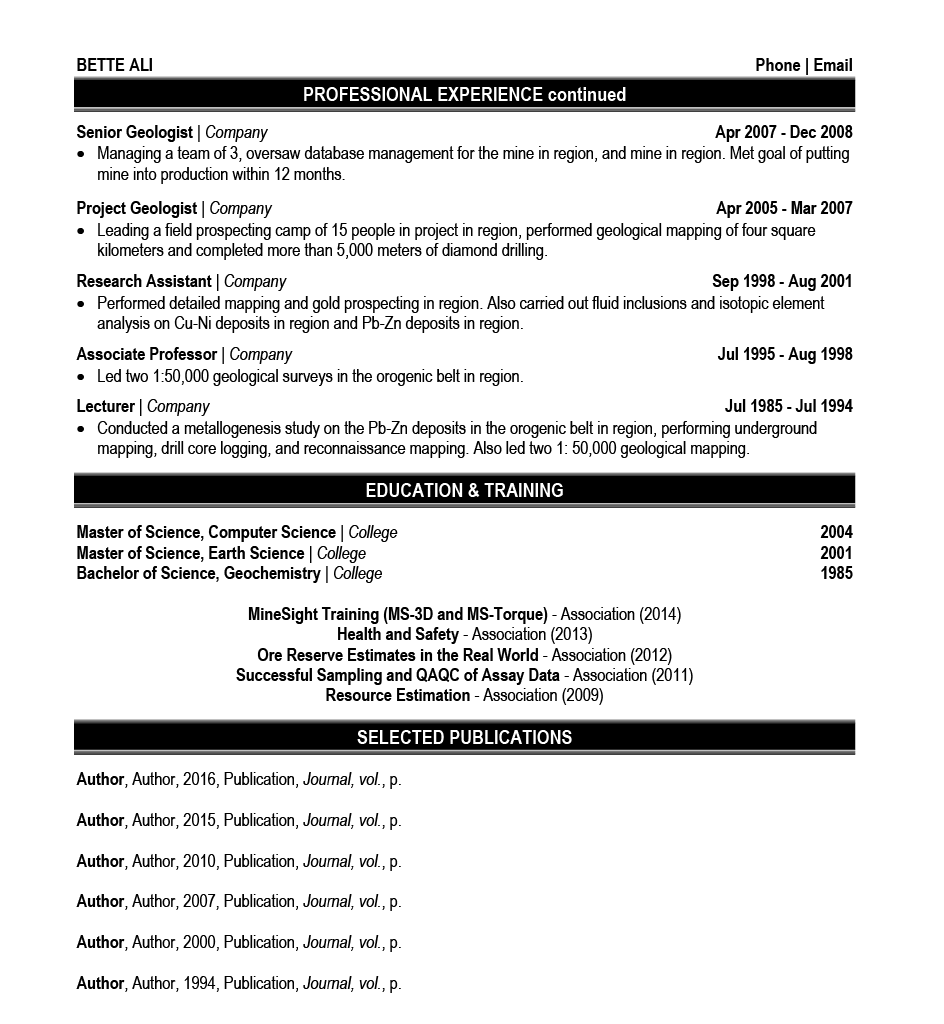

Rock formations tell complex stories, but your resume shouldn't be a mystery to decode. Many mining geologists struggle to translate technical fieldwork into compelling career achievements.
Are you finding it challenging to showcase both your scientific expertise and business impact? Your resume needs to bridge the gap between complex geological knowledge and measurable mining success stories that catch a hiring manager's eye.
Resume Target specializes in helping mining geologists transform technical experience into powerful career narratives. We'll help you craft a resume that speaks both to technical directors and corporate decision-makers, turning your geological expertise into interview opportunities.


As the detectives of the earth's hidden treasures, mining geologists are the crucial first step in transforming raw geological potential into valuable mineral resources, with specialized expertise in exploration, mine design, and environmental impact assessment.
Your work as a mining geologist combines advanced geological knowledge with practical field skills, as you analyze rock formations, create detailed geological maps, and use sophisticated technology to identify promising mineral deposits while ensuring sustainable mining practices.
Whether you're just starting out with basic field surveys or advancing to lead complex mining projects, the career path of a mining geologist offers diverse opportunities to grow from site geologist to exploration manager or even chief geologist, making lasting contributions to both industry and environmental stewardship.
Let's talk about what's exciting in the Mining Geologist field - your earning potential is impressive! As a professional who uncovers Earth's valuable resources, you're looking at a rewarding career path with substantial compensation opportunities that grow alongside your expertise and responsibilities.
Figures from: U.S. Bureau of Labor Statistics
Note: I've created estimated ranges based on the median salary provided, as specific breakdowns weren't available in the original data. These figures are approximations to give a general sense of the career progression.Mining Geologists can advance from field positions to specialized roles in mine design, safety, or mineral expertise. Your career path may lead from engineering services to senior positions in mining operations or academic research.
To accelerate your career growth, you'll need to master both technical expertise and leadership capabilities that go beyond basic geological knowledge.
- Advanced 3D Modeling and GIS Software - Mineral Resource Estimation - Project Management - Cross-functional Team LeadershipBreaking into mining geology typically starts with earning a bachelor's degree in geology or earth sciences, followed by gaining hands-on experience through internships or entry-level field positions.
To advance in this field, you'll need to develop both technical expertise like data collection and drill core analysis, along with essential soft skills such as problem-solving and attention to detail.
Requirements from MyNextMove
From California's engineering firms to Nevada's metal mines, Mining Geologist roles span both traditional and emerging markets.
Figures from U.S. Bureau of Labor Statistics
Struggling to translate your field experience, technical expertise, and geological discoveries into a compelling resume that catches a hiring manager's eye? This comprehensive, section-by-section guide will show you exactly how to create a professional mining geologist resume that highlights your most valuable skills and achievements.
As a Mining Geologist, you know how to analyze complex geological data and identify valuable mineral deposits, but condensing your expertise into a powerful resume summary can feel like trying to map an unexplored territory.
While you excel at interpreting rock formations and conducting resource assessments, translating these technical skills into compelling written statements that catch a hiring manager's attention requires a different kind of expertise - which is why having a well-crafted summary is crucial for standing out in the competitive mining industry.
How would you characterize your expertise balance between technical geological analysis and practical mining operations across your career journey?
Reason: This helps frame your professional identity by establishing the intersection between scientific knowledge and practical field experience - a crucial distinction that mining companies look for in their geological teams.
What combination of mineral exploration, resource estimation, and mine planning capabilities best defines your value to mining operations?
Reason: This question helps articulate your core professional strengths within the key pillars of mining geology, allowing you to craft a summary that resonates with both technical and operational leadership.
How have you integrated modern geological modeling software and traditional field methods throughout your career to drive mining efficiency?
Reason: This helps showcase your adaptability and contemporary relevance while acknowledging the fundamental importance of traditional geological expertise - a balance that's increasingly valuable in modern mining operations.
As a Mining Geologist, your skills section needs to demonstrate both your technical expertise in geological analysis and mineral exploration, as well as your practical field experience with mapping, sampling, and core logging.
From specialized software proficiency in tools like Leapfrog and Vulcan to hands-on experience with drill program supervision and resource estimation, your skills list should showcase both high-level analytical abilities and day-to-day operational competencies.
Showcase your geological expertise by organizing your experience into three powerful sections: a concise role overview that sets the stage, quantifiable achievements that highlight your discoveries and resource assessments, and core responsibilities that demonstrate your technical and field leadership capabilities.
Many Mining Geologists struggle to translate complex technical fieldwork and analytical findings into clear, business-focused accomplishments that executives understand. Transform your geological expertise into compelling metrics by connecting mineral discovery rates, resource estimation accuracy, and operational efficiency improvements to bottom-line results.
The responsibilities section demonstrates how Mining Geologists contribute to mineral exploration and extraction beyond basic fieldwork. Your duties should clearly show both technical expertise and business impact while helping non-technical hiring managers understand how your work drives successful mining operations.
Your geology credentials and specialized mining certifications are crucial for demonstrating your expertise in mineral exploration and deposit analysis. Lead with your highest geology degree and professional registrations, then highlight relevant certifications in areas like resource estimation, geotechnical assessment, or mine planning.
Now that you've built a strong foundation using Resume Target's proven resume writing guidelines, you're ready to transform your resume into a powerful tool for landing mining geology positions.
While many geologists make the mistake of using the same resume for every application, customizing your resume for each mining position is crucial for standing out in this competitive field.
By carefully aligning your experience and technical skills with each job's specific requirements, you'll not only satisfy ATS screening systems but also demonstrate to hiring managers that you understand their unique exploration and mineral assessment needs.
Ready to make your mining geology expertise shine? Let's turn your resume into a laser-focused document that proves you're the ideal candidate for each position you target!
Don't let a lack of professional experience hold you back from pursuing your dream career as a Mining Geologist!
Your academic background in geology, field experience from coursework, and relevant technical skills can create a compelling story that mining companies want to see.
Focus on highlighting your geological knowledge, field mapping experience, and analytical software proficiency as your key selling points.
For more detailed guidance on structuring your resume, check out the Student Resume Writing Guide to ensure you're presenting your qualifications in the best possible light.
Your geology degree and field experience are powerful assets that deserve to shine in your summary section - even without years of professional experience.
Focus on showcasing your technical skills, field work, research projects, and any relevant internships to demonstrate your readiness for a mining geology role.
"Detail-oriented and field-experienced Mining Geologist with comprehensive academic training in geological mapping, mineral exploration, and ore deposit analysis. Completed 300+ hours of fieldwork including core logging and sample analysis during university studies. Proficient in GIS software, geochemical sampling techniques, and 3D modeling tools. Seeking to leverage strong analytical abilities and passion for exploration geology to contribute to mineral discovery and development projects."
Now's your chance to showcase the specialized geological knowledge and technical training that makes you a standout mining professional!
Transform your academic background into compelling content by highlighting relevant coursework like "Economic Geology"or "Mineral Exploration Techniques,"plus any field mapping projects or ore deposit analysis that demonstrate your practical skills.
Courses common to a degree/certification for Mining Geologists include geology, chemistry, fluid mechanics, mine design, advanced mineral processing, economic geology, exploration methods, geochemistry of mineral deposits/hydrothermal geochemistry, geochronology and isotope geochemistry, structural geology, petrology/petrogenesis, and field mapping [1, 3, 4, 5, 6].Relevant Coursework: Advanced Mineral Processing | Economic Geology | Exploration Methods | Geochemistry of Mineral Deposits | Structural Geology | Field Mapping
Key Projects:
Mineral Deposit Characterization Study: Conducted comprehensive geological mapping and sampling of a potential gold deposit site to determine mineral resource potential and economic viability.
Regional Exploration Project: Led a team of four geology students in conducting a systematic exploration program for base metals in a greenfield area.
Leverage your academic background, field experience, and technical training by showcasing the specialized geological skills you've developed through coursework, internships, and hands-on fieldwork to create a compelling skills section that catches employers' attention.
As an entry-level Mining Geologist, your combination of technical knowledge and practical skills positions you well for the growing opportunities in mineral exploration and mining operations, where your expertise will be valuable in supporting critical resource discovery and extraction projects.
Let's face it - translating complex geological fieldwork, technical analysis, and resource evaluation into clear, compelling achievements can feel like trying to crack through bedrock with a plastic spoon.
At Resume Target, we specialize in crafting resumes for mining geologists that speak both the language of the earth sciences and the language of hiring managers.
Our expert writers have helped countless geologists showcase their expertise in mineral exploration, deposit modeling, and field mapping in ways that resonate with mining industry decision-makers.
With major mining companies ramping up exploration projects and the growing demand for critical minerals, now is the perfect time to transform your technical expertise into a powerful career story - let's start crafting your standout resume today.
Impress any hiring manager with our Geology resume writing service. We work with all career levels and types of Geology professionals.
Learn More → Geology Resume Writing Services